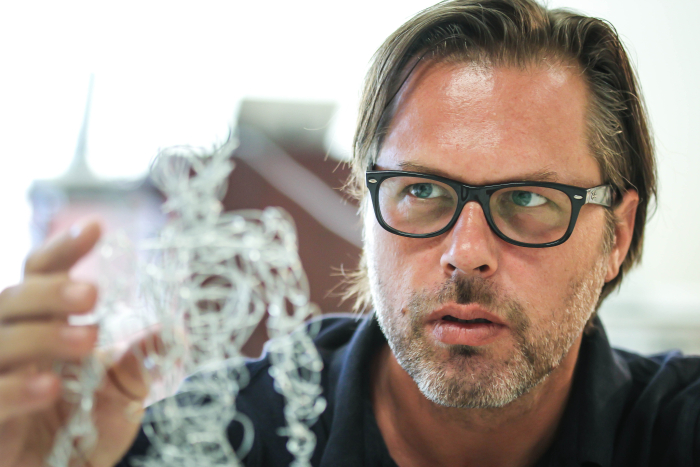Originally from Vienna, Kasper Kovitz joins Scripps College as an Assistant Professor of Art after teaching for several years in the Department of Fine Arts and Art History at the American University of Beirut in Lebanon. Kovitz is also an artist, and in his work he employs non-traditional materials—substances such as blueberry jam, dirt, and tree sap—to explore the concepts of borders, violence, and identity. His work has been included in exhibitions in Asia, Europe, and the United States, including at the MAK Center for Art and Architecture, Los Angeles, and ARCO Madrid.
Scripps College: What is your philosophy on the creation of art? And, another favorite question: What is art?
Kasper Kovitz: “Art” is an umbrella term for an extremely broad and vague field. It has been defined and redefined over the ages and by different cultures in many different ways, sometimes contradictorily. Not even the delineation of “fine art” solved the problem. While this elusiveness of clear meaning might annoy anyone who tries to imply a hierarchical value structure between the different motives for and modes of pursuing art, there is something very fitting about its vagueness—it reflects that it is a field in progress, and this term serves as a category for all that has trouble fitting snuggly into other categories.
What interests me the most of the various approaches—art as décor, art as self-expression, art as therapy, etc.—is that art is a way to examine preconceived notions. While art may take a form that is not object-based, I prefer the work that limits itself to the manipulation of objects, such as paintings, drawings, sculptures, and installations. Despite my own increasing interest in taking the author out of my work, some self-expression and authorship can never be denied in an object. Though my work may be seen as carrying my particular point of view or experience, I hope to continue to evolve and explore the greatest variety of points of view and, by doing that, challenge and reexamine that which we take all too easily for granted as “true.”
SC: What art or artists inspire you? When did you discover you were an artist and, later, a scholar of art?
KK: I have found that the artists who once inspired me, and who inspire me now, can change, and so are too numerous to name here. Artists who have an intense and remarkable work ethic and dedication to the subject of their investigation—even to the detriment of their living standard—inspire me the most. I often find their work to be the most striking and thought provoking, even if it is not the most pleasing at first glance.
I found an outlet in art early in life, and by age 16, I wanted to pursue it more than anything else. I wanted to spend as much energy and time on my work and had a gut feeling that art could not be taught. When I had the opportunity to teach, I found I wanted to tackle the question, “Can art be taught?” and it related to what I was thinking about in my own practice. I especially enjoy teaching in a liberal arts environment to students who may not want to become professional artists. Thinking and reevaluating the basics, which such an interaction necessitates, has enriched my own practice tremendously.
SC: How do you want Scripps students to approach art?
KK: I want them to be open-minded. Open to opinions and advice from others, including mine, but primarily open to the surprising and sometimes uncomfortable things they might discover when questioning preconceived ideas. Embrace creativity in the sense of finding new connections of existing ideas. And, most of all, I want them to discover the joy of self-discipline. Manipulating objects in novel ways takes a lot of time, concentration, and patience. Like in a sport, we can show you some tricks, correct your posture, but cannot give you the drive to excel beyond what comes easily—only you can do that.
SC: Do you have a random fact about yourself that is maybe surprising, or that people don’t know about you that you’d like to share with us?
KK: Despite what it may seem from my answers above, I do have a sense of humor.
For more of our Spotlight on Faculty series, click here.


